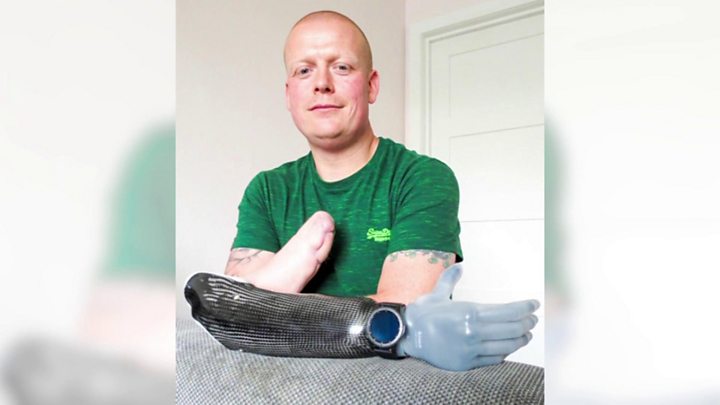
A firefighter whose hand was amputated after he was injured by faulty cutting gear has received £1.5m in damages.
Ian McDonald, 37, was taking part in a training exercise in March 2014 when his hand was pierced by a high-pressure jet of hydraulic fluid.
He had 40 operations after the toxic liquid destroyed the tissue in his right hand but after a four-year battle doctors were forced to amputate.
The fire service said it had taken steps to prevent similar incidents.
Mr McDonald was injured during an exercise at Bishopbriggs fire station, in East Dunbartonshire, which was simulating rescuing a casualty from a car accident using hydraulic cutting equipment.
It was only later that day he noticed his hand starting to swell and he began to feel a burning sensation.
There was a small puncture wound through the side of his hand.
"One of my colleagues looked at the glove I had been wearing at the time and there was a hole straight through it," Mr McDonald, who is from Bishopbriggs, said.
"This started alarm bells ringing that this was a serious consideration."
He was taken to hospital and an X-ray showed oil inside his hand.
It later emerged the hose pipe connecting the generator to the cutting gear, which pumps an internal fluid up to 850 Bars of pressure, was riddled with tiny punctures which can appear over time after being dragged over broken glass or metal shards at the scene of an incident.
One of these punctures caused a fine jet of hydraulic fluid to escape and pierce Mr McDonald's leather safety gloves.
Over the next four years, he was in chronic pain and suffering repeated infections as doctors battled to keep his hand working.
"The doctors were doing everything they could to save my hand but at one point I lost one of my fingers, then another finger.
"They were using grafts from my leg to save what they had but it became apparent during last year that it was just beyond repair."
His hand was finally amputated in June 2018.
"It was a big thing but I didn't really see there was any other route to go down," he said.
"I'd already lost my hand by that point in a sense.
"When it was actually physically removed it was no great loss compared to what I'd already been going through."
In January, the father-of-four was fitted with a prosthetic hand which he says has given him a lot more independence.
"It allows me to do things for myself and not ask for help and gives me a bit more confidence," he said.
He now has the dexterity to tie his own shoelaces and can help in the kitchen to a "limited" degree.
Looking back on the past five years, Mr McDonald said it had been "very difficult" emotionally and physically but he thanked his wife Claire for helping him get through.
"At times it was frustrating, knowing it was going on for so long and not making any progress," he said.
"Physically, it has really taken its toll. I think I had 40 operations in total, each one under general anaesthetic. I also had skin grafts taken from other parts of my body, from my leg three times, and transplanted on to my hand and my arm.
"The medication I was on was really energy-sapping. It's been a tough time."
He said the amputation had been "an overnight cure" for his pain and suffering.
"The pain has gone away and the function is improving with the prosthetic device and it is just allowing me to get back to normal as much as I can," he said.
An investigation into the incident by Digby Brown Solicitors revealed there was an inadequate system of inspection and maintenance for equipment despite the Scottish Fire and Rescue Service knowing about the risks.
There were also protective coverings for the hose which would have prevented Ian's injury but they were not used.
Solicitor David Nellaney said: "The SFRS is undoubtedly a safety-conscious organisation that provides an invaluable service but on this occasion it failed in its duty of care to an employee.
"No settlement can alter the past, but it can improve the future and in Ian's case, it will provide access to ongoing medical treatment and ease the financial implications of this workplace injury."
Scottish Fire and Rescue's David McGown said he was heartened to see Mr McDonald make a strong recovery.
He said: "Following a robust investigation into Mr McDonald's injury, we undertook a review of equipment and related safety checks and have taken appropriate steps to minimise the risk of similar incidents happening in the future."